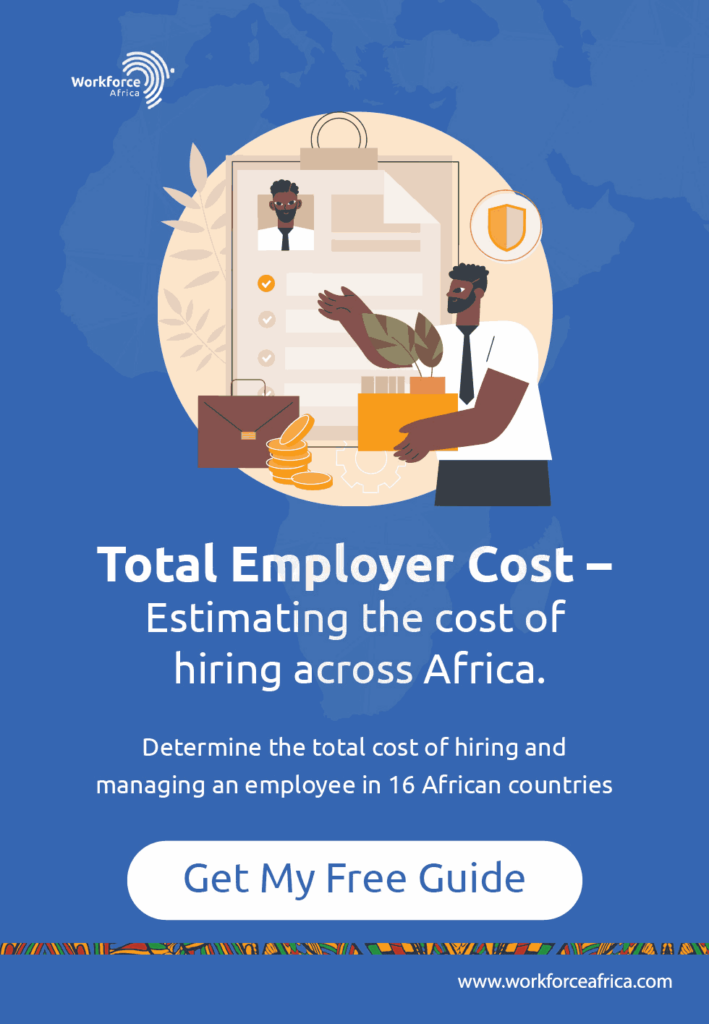
September 13, 2024

This article explores the complexities of managing payroll across African countries.
It provides insights into overcoming regional compliance challenges, implementing best practices for efficient payroll management, and leveraging strategic solutions to support businesses as they expand across Africa's diverse markets.
Expanding a business across borders in Africa presents numerous opportunities, but it also comes with unique challenges, particularly in managing payroll efficiently and compliantly.
Africa's diverse regulatory environments, tax laws, and labour practices make it crucial for businesses to adopt a well-structured payroll strategy.
This guide explores how companies can streamline payroll processes in Africa, highlighting key challenges such as regional compliance, currency differences, and workforce management.
By implementing best practices and leveraging strategic solutions, businesses can simplify payroll operations, ensure compliance, and support seamless growth.
Whether you're an established multinational or a startup, this guide provides valuable insights for cross-border business success.
Suggested Post: 7 Payroll Compliance Requirements in Nigeria
Expanding business operations across African borders presents unique challenges that can complicate payroll management.
Understanding these challenges is crucial for streamlining payroll processes and ensuring smooth business expansion.
Regulatory Complexity
Africa is a diverse continent with 54 countries, each having its own set of labour regulations, and compliance demands.
Navigating this regulatory landscape can be daunting. Companies must stay refurbished with the new legal changes to avoid penalties and ensure compliance.
This complexity often necessitates local expertise or partnerships with regional payroll service providers.
Currency Fluctuations
Currency volatility is a significant challenge in African cross-border operations. Exchange rate fluctuations can impact payroll calculations, leading to discrepancies in employee compensation.
Businesses must implement robust financial strategies to manage currency risks, such as using hedging techniques or maintaining multi-currency payroll systems.
Infrastructure and Technology
Inconsistent infrastructure and varying levels of technological advancement across African countries can hinder efficient payroll processing.
Limited access to reliable internet and banking services in some regions can delay salary disbursements and complicate payroll management.
Investing in scalable and adaptable payroll software operating in low-bandwidth environments is essential.
Cultural and Language Barriers
Africa's cultural and linguistic diversity can pose challenges in communication and employee management.
Misinterpretations due to language differences or cultural nuances can affect payroll accuracy and employee satisfaction.
Companies should invest in artistic training and employ multilingual staff to bridge these gaps.
Talent Acquisition and Retention
Attracting and retaining skilled talent is crucial for successful cross-border operations. However, varying employment standards and benefits expectations across countries can complicate payroll structures.
Offering competitive and compliant compensation packages tailored to local markets is key to overcoming this challenge.
Recommended Post: Introduction to Payroll Management
Developing a robust payroll strategy is essential for businesses expanding across African borders. Here are the core pillars that underpin a successful payroll strategy in this diverse and dynamic continent.
It is paramount to ensure compliance with local labour laws, tax regulations, and social security requirements.
Each African country has unique legal frameworks, and non-compliance can result in severe penalties.
Regularly updating payroll systems to ruminate changes in legislation and partnering with local experts can help maintain compliance and avoid legal pitfalls.
Managing multiple currencies is critical to cross-border payroll operations. Currency fluctuations can affect payroll accuracy and employee satisfaction.
Implementing a multi-currency payroll system and employing superior strategies can mitigate risks associated with exchange rate volatility.
This ensures employees receive consistent and fair compensation regardless of currency fluctuations.
It is crucial to leverage advanced payroll software that integrates seamlessly with existing HR and financial systems.
Such technology should be scalable and adaptable to different regional requirements.
Cloud-based solutions can offer real-time updates, data security, and accessibility, making payroll management more efficient and reliable across various African countries.
Understanding and respecting cultural differences is vital for effective payroll management. Africa's cultural diversity means that communication styles, work ethics, and employee expectations can vary significantly.
Providing cultural training for payroll staff and employing multilingual capabilities can enhance communication and reduce misunderstandings, leading to smoother payroll operations
Attracting and retaining top talent requires competitive and compliant compensation packages.
Tailoring benefits and incentives to meet local market standards can improve employee satisfaction and retention.
Additionally, offering career development opportunities and fostering a positive work environment can enhance loyalty and productivity.
Implementing a payroll strategy across multiple African countries requires careful planning and execution. Here are the key steps to ensure a successful rollout:
Conduct Thorough Research
Begin by understanding the regulatory landscape of each target country. This includes labour laws, tax regulations, social security requirements, and other compliance mandates.
Engaging with local experts or consultants can provide valuable insights and help navigate complex legal frameworks.
Develop a Comprehensive Plan
Create a detailed implementation plan that outlines the timeline, resources, and responsibilities.
This plan should include milestones for each rollout phase, from initial research to full implementation. Ensure all stakeholders are aligned and aware of their roles in the process.
Choose the Right Technology
Select a payroll system that can handle the complexities of cross-border operations. The system should support multiple currencies, integrate with existing HR and financial systems, and comply with local regulations.
Cloud-based solutions are often ideal as they offer scalability, real-time updates, and enhanced security.
Train Your Team
Provide extensive training for your payroll team on the new system and processes. This training should cover both technical aspects and cultural nuances of the countries involved.
Consider employing multilingual staff or providing language training to facilitate better communication and understanding.
Pilot the Strategy
Conduct a pilot in one or two countries before a full-scale rollout. This allows you to identify and address any issues in a controlled environment.
Gather feedback from local teams and make necessary adjustments to the strategy based on their experiences.
Monitor and Adjust
Once the payroll strategy is fully implemented, continuously monitor its performance. Key performance indicators (KPIs) are used to track efficiency, compliance, and employee satisfaction.
Be prepared to adjust to address any emerging challenges or changes in local regulations.
Foster Continuous Improvement
Encourage a culture of continuous improvement within your payroll team. Review processes regularly and seek feedback from employees to identify areas for enhancement.
Staying proactive and adaptable will help maintain the effectiveness of your payroll strategy over time.
Successfully managing payroll in Africa is critical to achieving smooth cross-border business expansion.
Businesses can mitigate risks and improve operational efficiency by understanding and addressing the region's complex regulatory landscape.
Adopting best practices, such as aligning payroll processes with local compliance standards and utilising digital tools, helps enhance scalability, and reduce errors.
As Africa emerges as a key player in the global economy, implementing strategic payroll solutions will be essential for sustained success.
Schedule a free consultation today for streamlined, compliant payroll management across the continent.